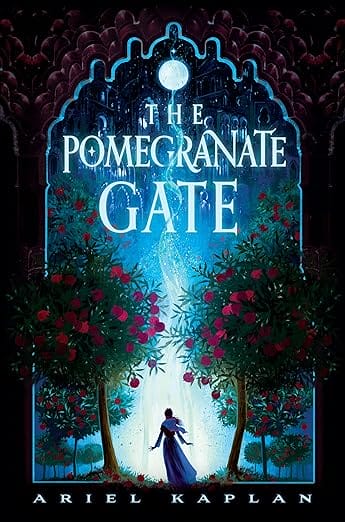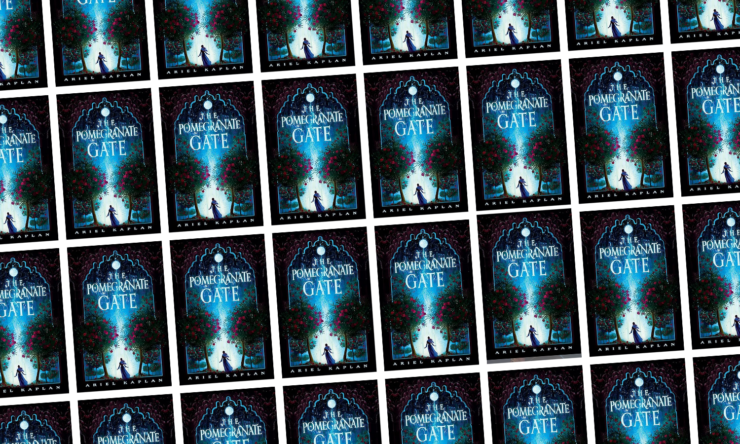The extent to which Ariel Kaplan’s The Pomegranate Gate draws upon the Jewish experience (or its re-envisioned memory) of medieval Iberia cannot be overstated. This lush, vivid and atmospheric novel draws Guy Gavriel Kay to mind. Not only is Kay’s The Lions of Al-Rassan the only fantasy novel I know to draw so deeply and so directly from this well, but Kaplan’s world, like Kay’s, treads narrowly along the line between historical fantasy and fantastical imagination. For both, the history is recognisably ours, with the names lightly altered (if at all). But unlike most of Kay’s work, Kaplan’s includes real magic and its great and terrible effects.
Naftaly Cresques will never be a good tailor, for all that he’s a tailor’s son. He dreams every night of strange cities, and when waking often sees things that aren’t there. With his father’s death, he falls heir to a book that’s been in his family for ten generations, one he must never lose and never read.
Toba Peres is a frail young woman. She can walk but running makes her fall; speak but shouting makes her throat close and stops her breath. She can write in multiple languages with both hands at once: one for Latin, one for Arabic. She wears an amulet to protect her, one that’s been in her grandmother’s family from time out of mind: a valuable thing with a great flawed sapphire at its heart.
Naftaly and Toba are Jewish, and live in the city of Rimon under the rule of the Christian Queen of Sefarad. When that Queen orders all her Jewish subjects to either convert (and be subject to the Inquisition if they’re found maintaining their old religion in secret) or go into exile from Rimon, any wealth they possessed stripped from them, Toba and Naftaly set out on the road in the same caravan. A peculiar encounter on the road finds them each separated from friends and kin. Lost in the woods, Toba follows a stranger through a bizarre gate in a pomegranate grove, and finds herself stranded in a world that mirrors her own: a world whose people have square-pupilled eyes and strange powers, and whose own version of the Inquisition, La Cacería (the Hunt), executes by fire all those they accuse of communicating with mortal humans. Her only allies are the man she followed, the dandyish Barsilay, and his patron, Adon Asmel. But for all their power compared to mortals, Barsilay and Asmel are themselves in a perilous position, one which Toba’s presence, with her mortal blood, only adds to. Dangers and changes and millennia-old plans are afoot in the mirror Rimon, and Toba finds herself unwillingly caught between her sometime protectors and their enemies.
Buy the Book


The Pomegranate Gate
Naftaly witnessed Toba disappear and could do nothing. Even more troubling, together with an old (strong-willed, cynical) beggar woman, he abruptly finds himself fifty miles down the road in the wrong direction when morning dawns. Meanwhile, Elena, Toba’s grandmother (who keeps a great number of secrets) has realised Toba’s gone missing. Naftaly is her only lead. Elena’s not going to let anything get between her and finding her dead daughter’s only child. But their time to escape Sefarad is running out. And though Naftaly doesn’t know it, the book he carries may be key to events in more than one world, and Elena’s determination to recover her grandchild will cast him into more danger than even the Inquisition can provide.
Kaplan weaves the strands of the narrative deftly together, with the solution to one mystery unfolding into the outlines of the next, each fresh revelation tightening the noose of tension around the characters and drawing the reader onwards. But tension and peril is balanced with wonder: The Pomegranate Gate is suffused with a sense of the numinous, with the marvelous and the strange. The world that Toba has fallen into is a world of Mazziks (a kind of demon or spirit mentioned in the Talmud, who in Kaplan’s interpretation seem akin to djinn) to whom salt is poison, but who create vast repasts by magically transforming lentils into all kinds of food, who ride strange-headed horses and can fly with wings made from nothing but their own will. Here are cities drowned by the waters of the firmament itself, demons trapped in a cage of salt, immortal scholars, peculiar dreams, and what I can only describe as inheritance shenanigans. In the less magical realm, the interplay between faith, ethical behaviour, survival and ideas of necessity might be less numinous but is no less intense and skilfully drawn.
Kaplan’s prose is lively, her imagery vivid and colourful. At times her register recalls that of fable or of poetry, but without sacrificing its readable accessibility. Even her minor characters come across as real, interesting people, and the main characters are compelling indeed.
The Pomegranate Gate started slow, and I didn’t expect to enjoy it as much as I did. But it’s well worth bearing with it as it gets going; in the end, it turns out, I loved it. This is a gorgeous and fascinating novel whose climax and conclusion makes it clear we can expect a sequel, and I’m very much looking forward to seeing how Kaplan follows it up.
The Pomegranate Gate is published by Erewhon Books.
Liz Bourke is a cranky queer person who reads books. She holds a Ph.D in Classics from Trinity College, Dublin. Her first book, Sleeping With Monsters, a collection of reviews and criticism, was published in 2017 by Aqueduct Press. It was a finalist for the 2018 Locus Awards and was nominated for a 2018 Hugo Award in Best Related Work. She was a finalist for the inaugural 2020 Ignyte Critic Award, and has also been a finalist for the BSFA nonfiction award. She lives in Ireland with an insomniac toddler, her wife, and their two very put-upon cats.










